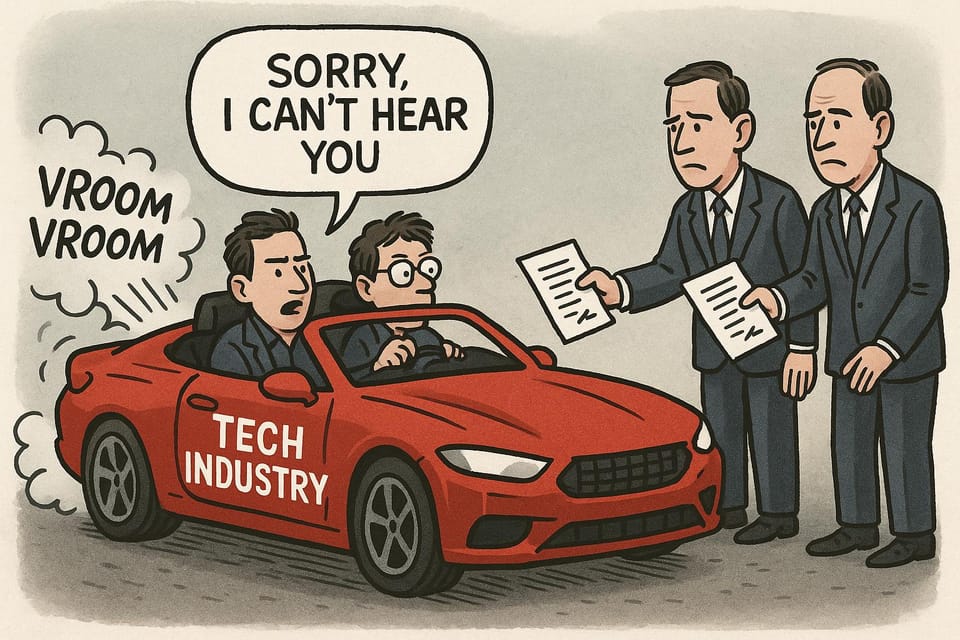Tech Regulation: Trying to Slow a Runaway Train?

The tech sector for some time has had the ‘move fast and break things’ mentality (too bad if children or democracy are the things being broken apparently), but AI has absolutely taken this to the next level in terms of the pace of development — “AI accelerationists” is literally the term for those who want to put the foot down hard in the belief there is only open road ahead of us!
I believe the next decade will be about abundant intelligence and abundant energy” - Sam Altman to Congress, May 8, 2025
This is excellent news Sam…oh wait, is that only abundance for the metrics important to you and your company?
So can this runaway train be slowed to a pace where it can be developed safely and fairly? Regulators and legal systems around the world are scrambling to catch up, but as these systems are still designed for more traditional businesses they are being stretched to address the latest round of digital challenges.
Here's a snapshot of the most significant legal battles and regulatory developments shaping the tech world in 2025.
⚡ Major Legal Showdowns
Apple vs US Department of Justice
This antitrust case alleges Apple maintains an illegal monopoly over smartphones particularly via its App store as it does not let an app seller send customers to a different location to purchase their product - thus locking them into Apples 30% take rate! Apple is seeking dismissal, but if the case proceeds, we could see significant changes to the App Store ecosystem and iOS developer restrictions. More at TechTarget
Google's Digital Advertising Empire Under Fire
Google faces potentially business-altering consequences in its ongoing antitrust trial over alleged digital advertising monopoly practices via its Google Chrome browser. A break up Google's ad tech business is a potential outcome. Case background
Tik Tok vs EU’s Digital Services Act (DSA)
Hot off the press, the European Commission formally charged TikTok on May 15, 2025, for failing to maintain a transparent advertising repository as required by the DSA, exposing ByteDance to fines of up to 6 % of global turnover. Guardian article
Meta monopolies - trying to shut the door once the horse has bolted
The Anti-trust case against Meta makes for good content — Kiwi Sarah Wynn-Williams book and Congress testimony is ‘chin on floor stuff’— but is unlikely to win. The case against Meta alleges it bought competitors such as Whatsapp and Instagram to consume them and reduce competition rather than ‘grow their business’. This is probably true, but the time for stopping these purchases was, you know…back when they needed permission to buy them! Updates on the case here
🌐 Regulatory Milestones to Watch
EU AI Act: The Implementation Countdown
The world's first comprehensive AI regulation is entering implementation, with initial prohibitions now in effect since February 2025. It introduces a risk-based approach, classifying AI systems into four categories, (Unacceptable, High, Limited, Minimal) each with different regulatory requirements.
The Act applies to anyone developing, deploying, or distributing AI in the EU, including companies outside the EU if their systems affect people within the EU. Non-compliance can result in fines up to €35 million or 7% of global annual turnover, whichever is higher. Act Summary
USA AI Regulation: Balancing Safety with Supremacy
The U.S. does not have an “AI Act” like the EU. While AI safety and risk mitigation remain important topics, especially in regulatory and research circles, the overriding narrative in Washington emphasizes the urgency of maintaining U.S. technological supremacy over China as a matter of national security and global influence. Perplexity summary on USA regulation (or lack thereof).
Crypto Industry get’s a return on its election investment
With President Trump’s return, the administration has adopted (as promised) a notably pro-crypto, deregulatory approach. Enforcement agencies such as the Department of Justice’s National Cryptocurrency Enforcement Team have been disbanded, and the SEC has dropped multiple lawsuits.
An inter-agency task force has been created charged with reviewing existing regulations. The group is set to propose a comprehensive federal regulatory framework for digital assets, including stablecoins. Clear regulations is what the industry has been asking for so that they are able to build with certainty as to what is required for compliance. Perplexity Summary of Crypto regulations
Australia’s Social‑Media Age Ban
Australia has introduced legislation to bar children under 16 from using social media platforms, backed by potential fines up to A$49.5 million and age‑verification trials (including biometrics) to enforce strict age cut‑offs. The law passed in November 2024 and will enter force after a one‑year trial in January 2026. Details on the Trial.
💡 Final thoughts
I believe the tug of war between rapid technological advancement (and the capital that sits behind it) and regulatory oversight will continue, likely remaining a perpetual give and take. It's important to stay informed about laws as they develop in our own countries – once regulations are established, they're notoriously difficult to amend or repeal. For AI especially, this awareness is crucially important.
For all of us as technology users, these developments will determine not just what innovations reach us, but how they're designed to respect our rights and values.
Until next time, keep Looking Up!
Sally
This newsletter is written by Sally with the help of Claude.




